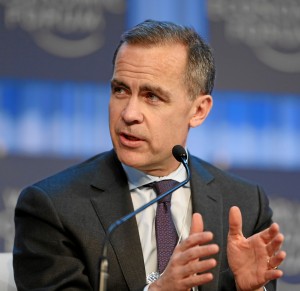Great Britain’s insurers are under the same level of scrutiny by government and central bank officials and top executives would still be held accountable in the same way as the nation’s major financial institutions in event of a catastrophe, said Bank of England Governor Mark Carney in a comment piece published Thursday in The Times.
Carney wrote that “integrity, honesty and skill” in senior managers are not optional traits to have, whether they’re involved in the insurance industry, investment banks or in charge of constructing societies.
The central bank head warned British insurance companies that they are “not too big to fail” and wrote that if he feels managements’ measures might pose a risk in the future then “we won’t hesitate to step in.”
 According to the former Bank of Canada governor, insurers were barely affected during the global financial crisis a few years ago, but noted that they still face risks in the future. He also urged insurers to be cautious when mulling riskier “less traditional investments” because of the influx of new capital being allocated into high-risk investment platforms.
According to the former Bank of Canada governor, insurers were barely affected during the global financial crisis a few years ago, but noted that they still face risks in the future. He also urged insurers to be cautious when mulling riskier “less traditional investments” because of the influx of new capital being allocated into high-risk investment platforms.
“So alongside reforms that Parliament has asked us to make to hold senior bankers to account, we will create a similar regime for senior managers in the insurance industry,” Carney stated in the British news publication.
In 2013, when Carney arrived on the scene, he imposed tough financial regulations and implemented the Prudential Regulation Authority (PRA) in order to carefully examine financial institutions and insurers.
The Bank of England will be working with its European counterpart – the European Central Bank (ECB) – in order to make it a simpler process for insurers to become better providers of funding to businesses of all sizes and to assist in paying for long-term infrastructure endeavors.
Insurance in the United Kingdom contributes more than $42 billion to the overall economy and has produced approximately 300,000 jobs. The UK is also home to the third-largest insurance market in the world today and British insurance firms earn about one-third of their income overseas.
It is estimated that British insurance companies offer a hub for roughly $4 trillion in savings. The Financial Conduct Authority, the nation’s financial watchdog, investigated earlier this year if individuals who are locked into 30 million pensions and other savings plans since 1970 are treated fairly compared with new clients.
The insurance industry is applauding Carney and his efforts.
“We are very pleased (Carney) recognises the value of the industry … You would expect the Bank of England to keep a close eye on an industry that is so fundamental to the UK economy and to people’s lives,” a spokesperson for the Association of British Insurers (ABI) told Reuters.
Meanwhile, a senior board member at a blue chip British insurance group spoke on the condition of anonymity and said that the way regulators are now taking an active interest in the business model of the industry is becoming quite beneficial for both insurers and consumers.
Carney was Governor of the Bank of Canada from 2008 to 2013 and was tapped to succeed Mervyn King at the helm of the British central bank last summer. In Canada, Carney was regularly praised for helping the country go through the Great Recession relatively unscathed, though his policies have led to near-zero interest rates, a higher national debt, enormous household debt levels and a hot housing market that many argue is in a bubble.



